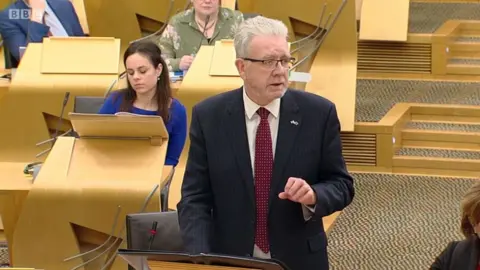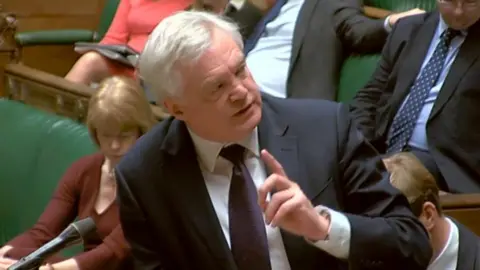Davidson backs UK-wide deal over Brexit for Irish border
 Reuters
ReutersScottish Conservative leader Ruth Davidson has backed a UK-wide deal to avoid a hard border in Ireland.
It had been suggested the UK government was prepared to accept a deal which would have seen Northern Ireland keep some regulations in line with the EU.
But the DUP - whose MPs prop up the government - said it could not accept any deal that treated Northern Ireland differently to the rest of the UK.
Ms Davidson said any regulatory alignment should be UK-wide.
Scotland's other political leaders have also backed a UK-wide solution, but differ on exactly what form it would take.
The Scottish government backs full single market membership, while the Conservatives want to focus on "specific areas".
UK Brexit Secretary David Davis told MPs it was a "falsehood" that the government had aimed for anything other than a UK-wide approach to regulation.
Ms Davidson campaigned prominently for Remain ahead of the EU referendum, and has since argued for the "largest amount of access" to the single market possible.
She said the referendum question "did not ask if the country should be divided by different deals for different home nations".
The Scottish Tory leader concluded: "All sides agree there should be no return to the borders of the past between Northern Ireland and the Republic of Ireland. Similarly, jeopardising the UK's own internal market is in no-one's interest.
"If regulatory alignment in a number of specific areas is the requirement for a frictionless border, then the prime minister should conclude this must be on a UK-wide basis."

Scottish Brexit minister Mike Russell later told MSPs that if full EU membership was not possible, then "a whole-UK approach to staying within the single market and the customs union is what is required".
He said: "That would be regulatory convergence, or a lack of regulatory divergence, call it what you will. That would be the best solution. Now in the circumstances we are in today, that is also the best solution to resolve the difficulty which has arisen in Ireland and Northern Ireland.
"Because it squares the circle - the impossibility of making one offer to Ireland and another to Northern Ireland - the only way out of that is to make sure the whole of these islands are in the single market and the customs union. If the Scottish Conservatives will support that, that will be a very considerable step forward."
Mr Russell warned that the EU would not accept "cherry-picking" of aspects of single market membership, before adding: "The solution to this is single market membership for the whole of the UK. If that is not available, then it is I think axiomatic that those places which can have a different arrangement should be allowed to do."
First Minister Nicola Sturgeon had earlier urged Labour to back single market membership for the whole UK - something the party's shadow Brexit minister Keir Starmer said should be "back on the table for negotiations".
Allow X content?
During the Holyrood session, Scottish Labour's Lewis Macdonald said that "if it's good enough for Northern Ireland, it's good enough for the whole of the UK".
Green co-convener Patrick Harvie said "differentiated models between parts of the UK and full single market membership" were "the only two options credible".
Mr Russell agreed, saying: "There are only two possible solutions. One is to have differentiated solutions, the better one is to have the solution for the whole of the UK. Anything else will not resolve this issue."
Lib Dem leader Willie Rennie meanwhile sought backing from the Scottish government for "a third option" - that "the British people should have the final say, whether this guddle is appropriate to accept".
Mr Russell said he had "certainly not ruled out supporting" the option of a fresh referendum on the Brexit deal.

Analysis by Brian Taylor, BBC Scotland political editor
There is widespread exasperation at the failure of the Brexit talks to move on to the next phase. But is there another faint emotion lurking somewhere in the shadowy background?
When politicians and commentators voice their frustration that the talks have foundered upon the question of Ireland, is there just a touch, a tiny scintilla of "how dare they?"
Remember that, as far back as 1990 (or, as recently, depending upon your view of history), the UK government declared that Britain had "no selfish strategic or economic interest" in Northern Ireland.
Is there, buried in the Westminster psyche, just a tiny touch of annoyance that the grand design of Brexit (or squalid manoeuvre, according to taste) is seemingly being held up by the Six Counties?
Does that surface, gasping slightly, in comments to the effect that the NI question has prompted problems "at the eleventh hour?" As if it were an adjunct, an irritant almost.

 PA
PAThere were suggestions on Monday that the UK may have been prepared to accept a deal which would see Northern Ireland retain some regulatory parallels with the EU in order to maintain an open border with Ireland.
This sparked a stern response from the Democratic Unionist Party, whose 10 MPs prop up Mrs May's Conservatives in government who said they would not accept any deal which treated Northern Ireland differently to the rest of the UK.
It also prompted calls from Ms Sturgeon, her Welsh counterpart Carwyn Jones and London Mayor Sadiq Khan to also have the option of "special status", were it available in Northern Ireland.
'Foolish mistake'
However, the UK's Brexit secretary has since denied this was ever on the cards.
Responding to an urgent question at Westminster, Mr Davis said: "The suggestion that we might depart the European Union but leave one part of the United Kingdom behind still inside the single market and customs union is emphatically not something that the UK government is considering.
"So when the first minister of Wales complains about it or the first minister of Scotland says its a reason to to start banging the tattered drum of independence, or the mayor of London says it justifies a hard border around the M25, I say they're making a foolish mistake."
He later underlined that "we will not be treating any part of the United Kingdom differently from any other part", before adding: "Alignment is not harmonisation. It is not having exactly the same rules; it is sometimes having mutually recognised rules, mutually recognised inspection and all that sort of thing. That is what we are aiming at."
